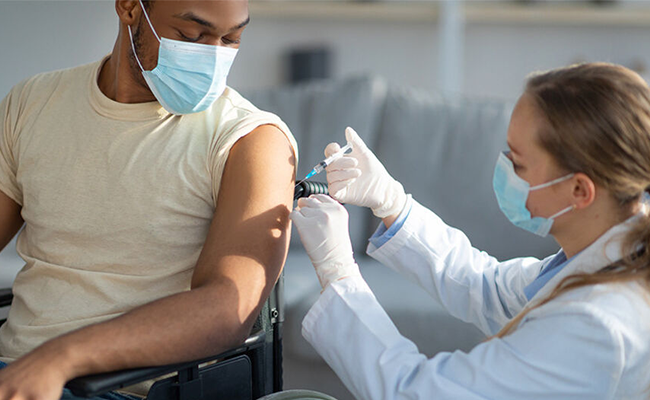During moments of upheaval— whether it be by war, economic hardship, or, most recently, the COVID-19 pandemic— the most vulnerable among us struggle the most. Historically, this has often been people of color, immigrants, single mothers, and, of course, working families. But, along with these groups, there’s another group that’s not often mentioned.
The disabled.
The services and resources that the disabled rely upon are often the first to be disrupted during times of trouble. When the country shut down in March 2020, the disabled lost access to teachers, enrichment programs, physical/occupational therapy sessions, and a whole host of services and activities that improve their lives and health.
In addition, even in “normal” times, access to healthcare can be difficult for the disabled. There are many reasons for this— limited transportation, communication barriers and accessibility issues, just to name a few. These barriers can be profound. Coupled with the biases that already exist within the healthcare system, the standard of care that a disabled person enjoys is generally much lower than that enjoyed by their able-bodied counterpart.
During these times, this imbalance becomes even more amplified. Some of the highest COVID-19 mortality rates have been within the disability community. This is why vaccine access has been so critical. Since there is no guarantee that a disabled person will receive proper medical care (or even have access to care), it is imperative that every effort be made to reduce the chance of a disabled person becoming ill in the first place. Therefore, prioritizing the disabled for COVID-19 vaccination has been the focus for many disability rights organizations.
But, simply vaccinating the disabled isn’t enough. Their caregivers, family members, coworkers, friends and roommates need to be vaccinated, as well. The health and safety of the disability community depends upon it. Further, this is why so much attention is being given to vaccinating the general population, as well— including the young, able-bodied and low-risk. The disabled and other high-risk folks do not live in a vacuum. Despite every effort being made to take precautions, the disabled are still vulnerable to the choices of others. There’s only so much they can do to protect themselves without others doing their part, too.
So, if you haven’t been vaccinated, yet, there’s still time! Visit www.myturn.ca.gov to make an appointment with a healthcare provider near you.
While the hardships experienced by the disability community have been difficult, it’s important to note that not all aspects of the COVID-19 pandemic have been negative. Specifically, the expansion of telehealth services and the explosion of work-from-home and remote-learning opportunities have been welcome developments— especially to those with mobility, sensory and immune conditions.
In truth, these technologies had been available for years. The disability community had already been advocating for such accommodations long before the arrival of COVID-19. Sadly, though, these adaptations weren’t implemented until able-bodied people began to need them, too. (Speaking of that— ever notice how closed-captioning didn’t become more widely available until able-bodied people started using it to watch Netflix while their babies were napping?)
Nonetheless, these new bridges of access have been essential for the disability community. It’s opened up opportunities that never existed before. So, when the pandemic ends (which it will), we need to make sure these accommodations don’t get put aside.
But, until that day comes, the disability community needs to stay safe and well— which is still a daunting challenge with new COVID variants. Recognizing the unique needs of those with intellectual and developmental disabilities (IDD), the CDC recently introduced a series of resources for this population. As Anthesis also strives to better serve the IDD community, too, we wanted to share that information here: https://www.disabilityscoop.com/2021/09/07/cdc-rolls-out-new-covid-19-resources-for-people-with-idd/29473/
Together, we can support the disability community as we all navigate these uncertain times.
But, be sure to do your part, too!

